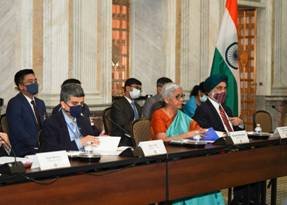Yellen and Sitharaman highlights new elements of the vital bilateral relationship
The United States and India have acknowledged the importance of working through multilateral development banks to help India access and mobilize available financing to support development objectives, including for climate.
This was announced through a joint statement following the eighth U.S.-India Economic and Financial Partnership meeting held by Treasury Secretary Janet L. Yellen and Finance and Corporate Affairs Minister Nirmala Sitharaman in Washington on 14 Oct 2021.
“We reiterated that regular and productive dialogue on economic policies is crucial to the relationship and to achieving our shared global future,” said Yellen and Sitharaman in the joint statement.
The ministerial meeting took stock of the extensive efforts that have already been undertaken by both sides to deepen mutual understanding and highlighted new elements of the vital bilateral relationship.
Federal Reserve Chair Jerome Powell and Reserve Bank of India Governor Shaktikanta Das participated in the meeting along with top financial sector officials from the two countries.
The rest of the joint statement:
We had productive discussions on a range of subjects, including the macroeconomic outlook and recovery from the pandemic, financial regulatory and technical collaboration, multilateral engagement, climate finance, and anti-money laundering and combating the financing of terrorism (AML/CFT).
We acknowledged the unprecedented impact that the COVID-19 crisis has had on lives and livelihoods. We also addressed the importance of maintaining supportive policies until a strong and inclusive recovery is firmly entrenched.
Today’s meeting featured the Economic and Financial Partnership’s first session dedicated to climate finance, reflecting our respective commitments to driving urgent progress in combatting climate change and the critical role of climate finance in achieving this shared global goal. We shared views on the re-energized global efforts to increase climate ambition as well as our respective domestic efforts to meet our publicly expressed climate goals.
We agreed that public finance, when paired with enabling policies, can promote private finance. We reaffirmed the collective developed country goal to mobilize US$100 billion annually for developing countries from public and private sources, in the context of meaningful mitigation actions and transparency on implementation.
We intend to engage further on addressing climate change between our two ministries, as well as through the Finance Mobilization pillar of the recently launched Climate Action and Finance Mobilization Dialogue (CAFMD) under the U.S.-India Climate and Clean
Energy Agenda 2030 Partnership.
We reemphasized our commitment to the central role of multilateral cooperation in addressing global challenges. Both sides affirmed their commitment to debt sustainability and transparency in bilateral lending. We acknowledged the importance of working through multilateral development banks to help India access and mobilize available financing to support development objectives, including for climate.
We welcome the OECD/G20 Inclusive Framework political agreement on October 8 as representing a significant accomplishment for updating the international tax architecture to reflect the modern economy and establish an international tax system that is more stable, fairer, and fit for purpose for the 21st century. We should work together and with other partners at the technical level in order to expeditiously implement Pillars 1 and 2 by 2023.
We take note of the progress made in sharing financial account information between the two countries under the Inter-Governmental Agreement pursuant to the Foreign Account Tax Compliance Act (FATCA). The two sides should continue to engage in discussions on full reciprocal arrangement on FATCA. The two sides look forward to continued collaboration for increased cooperation in sharing of information for tackling offshore tax evasion.
We plan to continue engaging on these and other global economic issues both multilaterally and bilaterally. India and the United States look forward to continued collaboration to support the global recovery under the G20 Presidency of Indonesia next year. As India prepares for its 2023 G20 Presidency, the United States stands ready to support India in hosting a successful and productive year.
The United States and India continued our strong collaboration on financial regulatory issues.
In June of this year, financial regulators from both sides met for the tenth U.S.-India Financial Regulatory Dialogue to discuss a range of issues, including banking and insurance sector reform, capital markets development, payment system modernization, and data protection frameworks. In our discussions, we highlighted important structural reforms both sides have taken to strengthen their respective domestic financial systems and recognized areas where further efforts can promote growth and financial stability.
The United States and India look forward to discussions on emerging financial sector topics, such as cross-border payments and payment systems and the development of the International Financial Services Centre at GIFT City.
We are continuing our successful collaboration on attracting more private sector capital to finance India’s infrastructure needs, which will support growth in both countries.
The United States continues to provide technical support to India’s National Infrastructure and Investment Fund (NIIF), including the scaling of debt and equity platforms devoted to renewable energy and implementing new environmental, social, and corporate governance policies to meet international standards, while catalyzing private institutional investment in Indian infrastructure. We are also collaborating through continued technical support for the issuance of municipal bonds, including Green Bonds, for critical urban infrastructure improvements. India and the United States look forward to working together to prepare more cities to issue municipal bonds.
We continue to strengthen our cooperation in tackling money laundering and combating the financing of terrorism through increased information sharing and coordination. Both sides agree on the importance of fighting financial crimes and on the effective implementation of the Financial Action Task Force standards to protect our financial systems from abuse.
This eighth meeting of the Economic and Financial Partnership reflected the growing importance of the U.S.-India relationship and the increasing economic and financial ties between our two economies. Both sides eagerly anticipate continued dialogue under the Economic and Financial Partnership and the further strengthening of our bilateral relationship. #economies #investment #banking #development /fiinews.com










